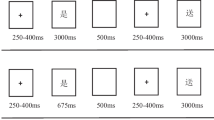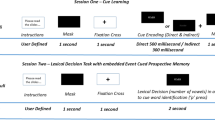Abstract
In this paper, we make a preliminary attempt to approach the phenomenon of prospective memory (PM) from the point of view of Haken’s theory of synergetics that refers to complex, self-organizing systems, in general, and to brain functioning and cognition, in particular. In the following, we consider one form of PM only—the so-called event- or cue-dependent PM. We first interpret cue-dependent PM in terms of synergetics and then applythe mathematical formalism of synergetics.








Similar content being viewed by others
References
Brandimonte M, Einstein GO, McDaniel MA (eds) (1996) Prospective memory: theory and applications. Lawrence Erlbaum, Mahwah
Bravin JH, Kinsella GJ, Ong B, Vowels L (2000) A study of performance of delayed intentions in multiple sclerosis. J Clin Exp Neuropsychol 22(3):418–429
Burgess PW, Quayle A, Frith CD (2001) Brain regions involved in prospective memory as determined by positron emission tomography. Neuropsychology 39(6):545–555
Burgess PW, Scott SK, Frith CD (2003) The role of the rostal frontal cortex (area 10) in prospective memory: a lateral versus medial dissociation. Neuropsychology 41(8):906–918
Einstein GO, McDaniel MA (1990) Normal aging and prospective memory. J Exp Psychol Learning Memory Cogn 16(4):717–726
Einstein GO, McDaniel MA, Smith RE, Shaw P (1998) Habitual prospective memory and aging: remembering intentions and forgetting actions. Psychol Sci 9:4
Ellis J, Kvavilshvili L (2000) Prospective memory in 2000: past, present, and future directions. Appl Cogn Psychol 14:1–9
Goschke T, Kuhl J (1993) Representation of intentions: persisting activation in memory. J Exp Psychol Learning Memory Cogn 19:1211–1226
Graf P, Uttl B (2001) Prospective memory: a new focus for research. Conscious Cogn 10:437–450
Haken H (1983) Synergetics. An introduction. Springer, Berlin Heidelberg New York
Haken H (1987) Advanced synergetics. An introduction, 2nd edn. Springer, Berlin Heidelberg New York
Haken H (1988/2000) Information and self-organization: a macroscopic approach to complex systems. Springer, Berlin Heidelberg New York
Haken H (1990) Synergetics of cognition. Springer, Berlin Heidelberg New York
Haken H (1991) Synergetic computers and cognition. Springer, Berlin Heidelberg New York
Haken H (1996) Principles of brain functioning. Springer, Berlin Heidelberg New York
Haken H, Kelso JAS, Bunz H (1985) A theoretical model of phase transitions in human hand movements. Biol Cybern 51:347–356
Haken H, Portugali J (2003) The face of the city is its information. J Environ Psychol 23(4):382–405
Kelso JAS (1995) Dynamic patterns. MIT Press, Cambridge
Marsh RL, Hicks JL (1998) Event-based prospective memory and executive control of working memory. J Exp Psychol Learning Memory Cogn 24(2):336–349
Marsh RL, Hicks JL, Hancock TW (2000) On the interaction of ongoing cognitive activity and the nature of an event-based intention. Appl Cogn Psychol 14:29–41
Marsh RL, Hicks JL, Watson V (2002a) The dynamics of intention retrieval and coordination of action in event-based prospective memory. J Exp Psychol Learning Memory Cogn 28(4):652–659
Marsh RL, Hancock TW, Hicks JL (2002b) The demands of an ongoing activity influence the success of event-based prospective memory. Psychon Bull Rev 9(3):604–610
McDaniel MA, Einstein GO (2000) Strategic and automatic processes in prospective memory retrieval: a multiprocess framework. Appl Cogn Psychol 14:27–144
Neisser U (1982) Memory observed: remembering in natural contexts. WH Freeman, San Francisco
Portugali J (ed) (1996) The construction of cognitive maps. Kluwer, Dordrecht
Portugali J (1999) Self-organization and the city. Springer, Berlin Heidelberg New York
Reese CM, Cherry KE (2002) The effects of age, ability, and memory monitoring on prospective memory task performance. Aging Neuro 9(2):98–113
Sellen AJ, Louie G, Harris JE, Wilkins AJ (1997) What brings intentions to mind? A study of prospective memory. Memory 5(4):483–507
Shannon CE, Weaver W (1949) The mathematical theory of communication. University of Illinois Press, Urbana
Smith RE (2003) The cost of remembering to remember in event-based prospective memory: investigating the capacity demands of delayed intention performance. J Exp Psychol Learning Memory Cogn 29(3):347–361
Smith G, Della Sala S, Logie RH, Maylor EA (2000) Prospective and retrospective memory in normal ageing and dementia: a questionnaire study. Memory 8(5):311–321
Taylor RS, Marsh RL, Hicks JL, Hancock TW (2004) The influence of partial-match cues on event-based prospective memory. Memory 12(2):203–213
Van Der Berg SM, Aarts H, Midden C, Verplanken B (2004) The role of executive processes in prospective memory tasks. Eur J Cogn Psychol 16(4):511–533
Vogels WWA, Dekker MR, Brouwer WH, de Jong, R (2002) Age-related changes in event-related prospective memory performance: a comparison of four prospective memory tasks. Brain Cogn 49(3):341–362
West R, Herndon RW, Crewdson SJ (2001) Neural activity associated with the realization of a delayed intention. Cogn Brain 12(1):1–9
West R, Jakubek K, Wymbs N (2002) Age-related declines in prospective memory: behavioral and electrophysiological evidence. Neurosci Biobehav Rev 26(7):827–833
Author information
Authors and Affiliations
Corresponding author
Rights and permissions
About this article
Cite this article
Haken, H., Portugali, J. A synergetic interpretation of cue-dependent prospective memory. Cogn Process 6, 87–97 (2005). https://doi.org/10.1007/s10339-004-0041-z
Received:
Revised:
Accepted:
Published:
Issue Date:
DOI: https://doi.org/10.1007/s10339-004-0041-z




